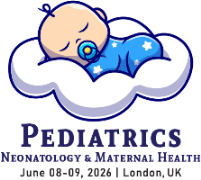
Carmina Erdei
Brigham and Womens Hospital
USA
Abstract Title:Serial neuroimaging of brain growth and development in very preterm infants receiving tailored neuropromotive support in the NICU. Protocol for a prospective cohort study
Biography:
Dr. Carmina Erdei, MD holds triple board certification in Pediatrics, Neonatal-Perinatal Medicine, and Developmental-Behavioral Pediatrics. She is a neonatology faculty member in the Department of Pediatrics at Brigham and Women's Hospital. She is also the medical director of the Growth and Development Unit, a subunit of the BWH Neonatal Intensive Care Unit (NICU) where infants at highest neurodevelopmental risk receive expert neurorehabilitative care while preparing for transition to home. Her research focuses on improving outcomes of high-risk infants through optimization of the NICU neurosensory environment within the family-centered developmental care framework. Dr. Erdei is an Instructor in Pediatrics at Harvard Medical School.
Research Interest:
Introduction: Children born very preterm (VP) remain at risk for long-term neurodevelopmental impairment. Patterns of brain growth and injury, and how early neuropromotive therapies might mitigate developmental risk in VP infants remain insufficiently understood. Methods: This is a prospective cohort study of VP infants born at/before 32 weeks gestation. The study will enroll n = 75 consecutively-born VP infants in a level-III NICU. Exposed infants will be categorized into two groups (group 1: low-risk, n = 25 or group 2: high-risk, n = 25) based on the degree of neurological injury on early brain magnetic resonance imaging (MRI) at enrollment. Infants in the low-risk group (i.e., without significant injury defined as intraventricular hemorrhage with dilation, moderate or severe white matter injury, or cerebellar hemorrhage) will receive neurodevelopmental support utilizing the Supporting and Enhancing NICU Sensory Experiences (SENSE) program, while infants in the high-risk group (with neurological injury) will receive more intensive neurorehabilitative support (SENSE-plus). Age-specific, tailored sensory experiences will be facilitated contingently, preferentially by the infant's family with coaching from NICU staff. VP infants in exposure groups will undergo a brain MRI approximately every 2 weeks from enrollment until term-equivalent to monitor brain growth and evolution of injury. Exposed infants will be compared with a reference group (group 3: n = 25), i.e. VP infants whose families decline initial enrollment in SENSE, and subsequently undergo a term-equivalent brain MRI for other purposes. The primary aim of this study is characterization of term-equivalent brain growth and development among VP infants receiving NICU-based neuro promotive interventions compared to VP infants receiving the standard of care. Secondary aims include defining the timing and factors associated with total and regional brain growth on serial brain MRI among VP infants, (Aim 2), and using early imaging to tailor developmental intervention in the NICU while exploring associations with outcomes in VP infants at discharge and at two years corrected age (Aim 3). Discussion: This study will address gaps in understanding patterns of brain growth and injury drawing on serial MRI of hospitalized VP infants. These data will also explore the impact of intensive, tailored neuropromotive support delivered prior to term-equivalent on child and family outcomes.

